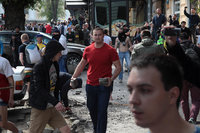The true effects of American involvement
By Peter Trevenen

As the crisis in Ukraine escalates, and America's involvement becomes more apparent, it is difficult to avoid looking to the past for omens of what is to come. This situation, after all, is not unique. The United States has considered itself the world's guardian and liberator since World War II, where its contribution was welcome and necessary. Since then, though, the American government has frequently involved itself in political situations where it was decidedly unnecessary, and where its influence has been anything but welcome.
Take Nicaragua, for example. In 1979, the Sandanista Junta of National Reconstruction took power to try and mend the nation's crippling corruption via an uprising of the people (not dissimilar to the current uprisings in East Ukrainian cities.) They began instituting a variety of policies aimed at reconstituting the impoverished, disenfranchised Nicaraguan populace, and sought to create a freer, more democratic nation. Their policies would have been successful as well, had it not been for the influence of one of the world's superpowers: the United States. The Reagan administration, terrified that the Sandanista's liberal views would evolve into communist views, began a campaign to end the Junta. The course they chose to achieve this, however, serves as a reminder of the startling lengths the United States government will go to to achieve their ideological or political goals, or to neutralize perceived threats.
In a move that bodes poorly for the East Ukrainian activists, the United States began a pattern of state-sponsored terrorism, gross human rights violations, breaches in international law, and economic destruction. The "contras," as the anti-Sandanista insurgents were called, received weapons, training and money from the US Central Intelligence Agency. Not only that, but this support continued even as reports began to flow in of human rights abuses and massive civilian casualties caused by the contra insurgents, and despite a Congressional ban on US support for the cause. In "The Contras' Litany of Destruction," and article published in the UK newspaper The Guardian, reporters Jonathan Steele and Tony Jenkins covered the story of one Sandanista militiaman and his experiences with the contra insurgency. The following, extremely graphic description, tells of the fate of his companions who were captured by the contras: "Rosa had her breasts cut off. They cut into her chest and took out her heart. The men had their arms broken, their testicles cut off. They were killed by slitting their throats and pulling the tongue out through the slit."
Even that description, however, pales in comparison to the reports released by human rights observers from around the world. The Human Rights Watch's "Americas Watch Committee" mentions several violations of international law in their 1986 publication on the issue. Among them are such crimes as kidnapping, torturing and executing non-combatant civilians, destroying or seizing civilian property indiscriminately, raping women and assassinating foreign aid workers. This was all done, of course, with resources given to them by the United States government. As the 1986 report on Nicaraguan human rights states, the Reagan administration was "engaged in a concerted effort to distort the facts." The United States, in order to further their own international political goals, actively funded a terrorist organization and gave them resources with which to commit their horrific abuses. Furthermore, the United States compounded the problem with a series of embargoes on Nicaragua. This devastated the Nicaraguan agricultural sector, affecting the most disadvantaged of its citizens. As the Sandanistas tried to fix their ailing nation, the USA was actively trying to deestablish it. This, unfortunately, is a pattern that America has repeated frequently since then. The Mujahadeen, Orlando Bosch, Luis Posada Carilles, Syrian rebels, all represent groups that were secretly supported by the United States who took part in terrorist attacks and human rights violations funded by the same.
Now, as the pro-US, far right Ukrainian nationalists begin their violent operations against civilians, in cooperation with the Kiev government, it is nearly impossible not to draw comparisons. The United States, which has been an outspoken supporter for the Kiev government, has so far denied any military involvement in the country, but how long will that denial remain plausible? The government of the United States of America has, time and time again, shown that it can't resist sticking its fingers in foreign affairs, even when it has no legitimate interests. Is it possible that they will remain vocal but not active? Certainly. But, as history has shown, direct US involvement grows more and more likely as this crisis continues. It is only a matter of time before vocal condemnations transform into direct action support and I, for one, hope that the situation can resolve itself before US involvement turns a crisis into a bloodbath.
Peter Trevenen
Subscribe to Pravda.Ru Telegram channel, Facebook, RSS!





